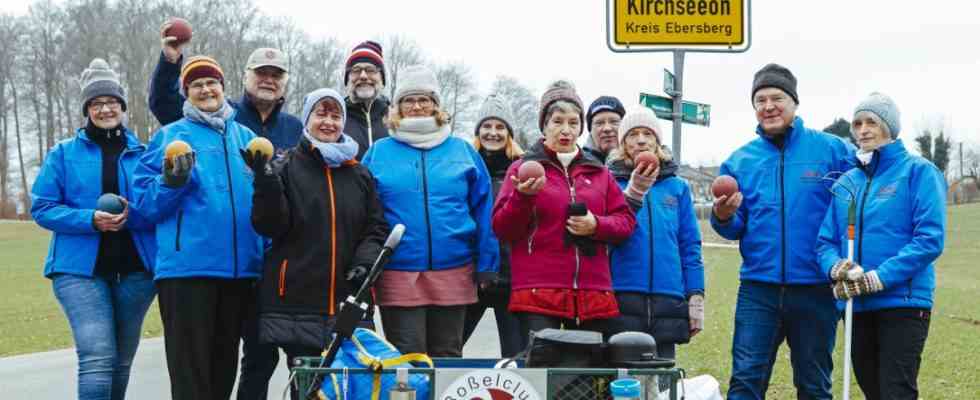North Germans in Bavaria – by no means an exception, but still viewed with slight suspicion in some places. Newcomers should exercise a certain amount of caution if they make too common with Bavarian customs such as Schuhplatteln and lederhosen. At the same time, North German customs have secretly found their way into Upper Bavaria: people go bossing.
Even if this is partly written with ss – i.e. Bosseln – especially in the online version: It has nothing to do with a superior, it is also not another form of the Bavarian word “busseln”. Rather, it is a recreational activity somewhere between bowling, shot put and golf. It is played on forest paths; Snacks and – preferably alcoholic – beverage reserves are pulled along on a wagon.
In Kirchseeon in the district of Ebersberg, such groups are out and about in the forest to indulge in the custom from the north. There are tournaments twice a year and training once a month. The Boßel – a ball – is advanced with as few throws as possible over a distance of mostly several kilometers. Two or more teams compete against each other. A gentleman from Bremen brought the Nordic leisure cult to Kirchseeon, reports the chairman of the Kirchseeon Boßelclub, Michael Stengert. The gentleman moved away, Boßeln stayed. “So many people enjoyed it. We had to buy more and more balls and equipment. That’s when we decided to start a club.”
That was in 2007 – with the Boßelclub Kirchseeon, Bavaria’s first Boßel club was founded. Boßeln – at least in the leisure version – also includes schnapps in the north: Depending on the interpretation of the rules, there is a shot, in the north called “Schnäpsken”, at every crossing, every bridge or even every street lamp. However, that was not the case in Kirchseeon. “This rule is no longer made,” says Stengert.
The Frisian home game has a centuries-old history. According to the Kirchseeon Association, the oldest certified document dates back to 1585, when Duke Adolf von Gottorf allowed the Husum bowling and bossel youth to practice in the Husum Castle Park. It’s now become a veritable industry in some northern areas, with chemical-toilet-lined Bossel plains, insanely decorated handcarts, and big schnapps and kale parties during the January-March season.
“Of course that also applies to Upper Bavaria,” says the customs expert
But: Don’t Bayern have enough of their own customs and games? Fingerhappening, curling, sheepsheads. Are northern German customs doing well in the south? For Michael Ritter from the Bavarian State Association for Homeland Care, that’s not a question. “Of course that also applies to Upper Bavaria,” says the customs expert. “It has always been the case that customs have adapted and cultural transfer has taken place.” According to the state association, Boßeln temporarily found its way into the Swabian Horgau in Swabia after a traditional Almabtrieb had been transferred from there to the north. In Klein Escherde near Hanover, the Heimatverein had the idea of staging a cattle drive after a kale hike – the tour to eat charcoal is also northern German and has not yet arrived in Bavaria. Due to a lack of know-how, the Klein Escherder turned to Bavaria. Almabtrieb helpers came from Swabia, were allowed to take part and then planned their own tournament at home. However, interest there has waned again.
There is another Boßelclub with around 80 members in Erlangen in central Franconia. “I was born in North Germany, I introduced it here,” says Chairman Jan-Frederik Gnichwitz. “The Bavarians are a friendly bunch. Socializing together with a little competition – that goes down very well.” However, the Free State offers more difficult scenic conditions compared to the flat East Friesland or Emsland, says Gnichwitz. In hilly terrain, a ball is lost more quickly. Players have to search longer and buy supplies more often. The club from the south is therefore already a main customer for the Bossel online retailer.
Erlangen has a special schnapps rule: the penalty schnapps for mistakes. This further increases the gap between the teams, and the higher the alcohol level, the harder it is to hit. Gnichwitz is still working on the introduction of the kale meal traditional in the north after sporting activity. “I’ve suggested it to restaurateurs and they made it for us once.” But it has not established itself. According to Gnichwitz, however, interest in bossing is unbroken. New players often come to the meetings: friends – and curious people. “When you walk around in the forest, people keep coming by and asking: What are you doing there?” Then they are invited.
The two Bavarian clubs in Kirchseeon and Erlangen mainly complain about the difficulty of tournaments with other clubs. There are no like-minded people in neighboring towns like in the home of Boßeln, and it’s a long way from the north. “We don’t have any real rival clubs. Unfortunately,” says Stengert. In the summer he and his Kirchseeoner are now invited to Erlangen. It’s also in the north, but not quite as far.

